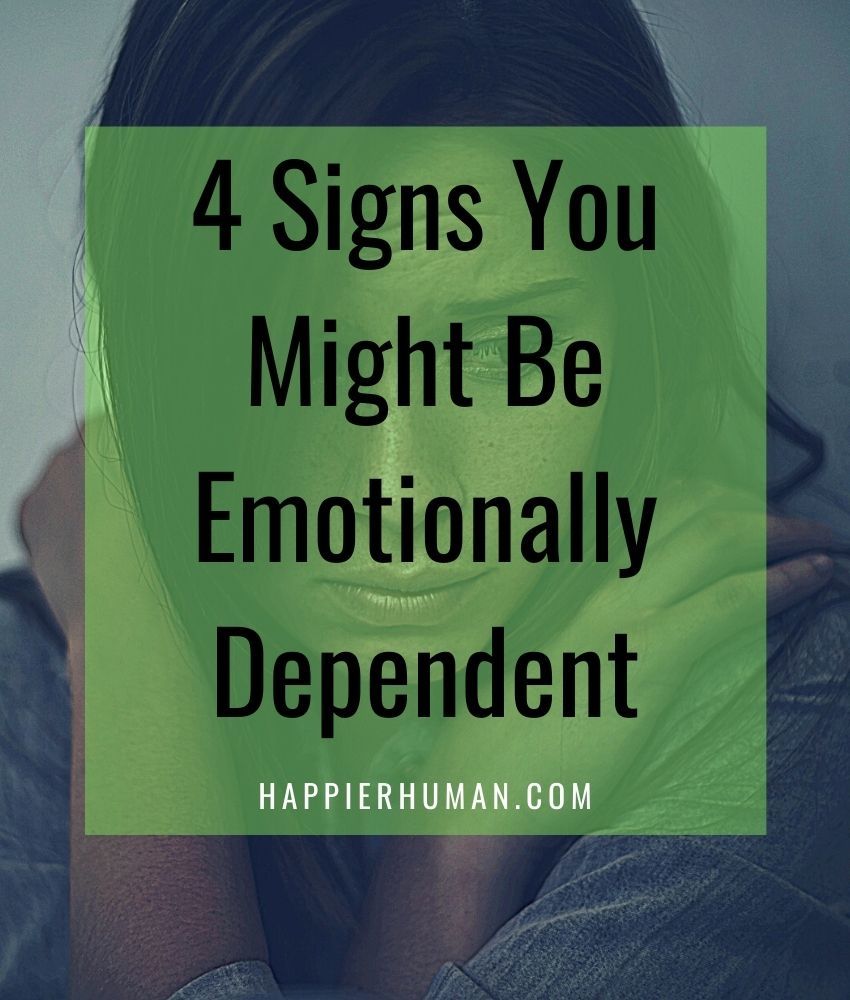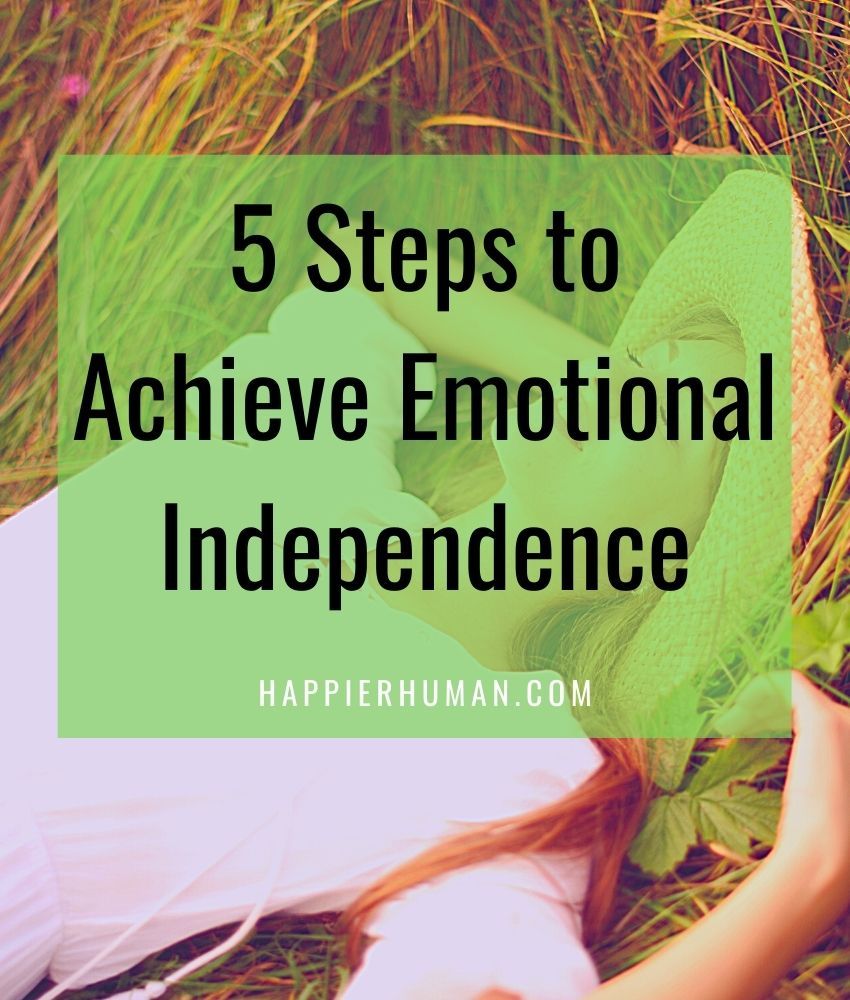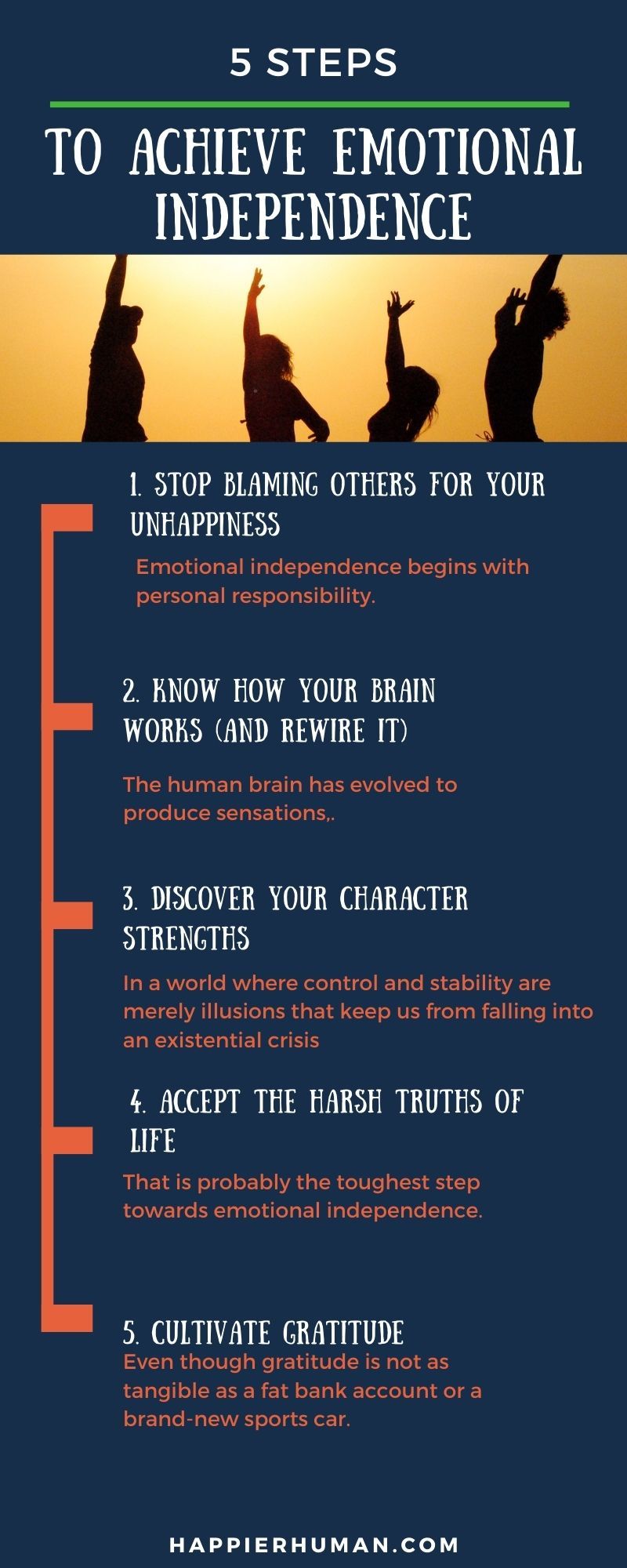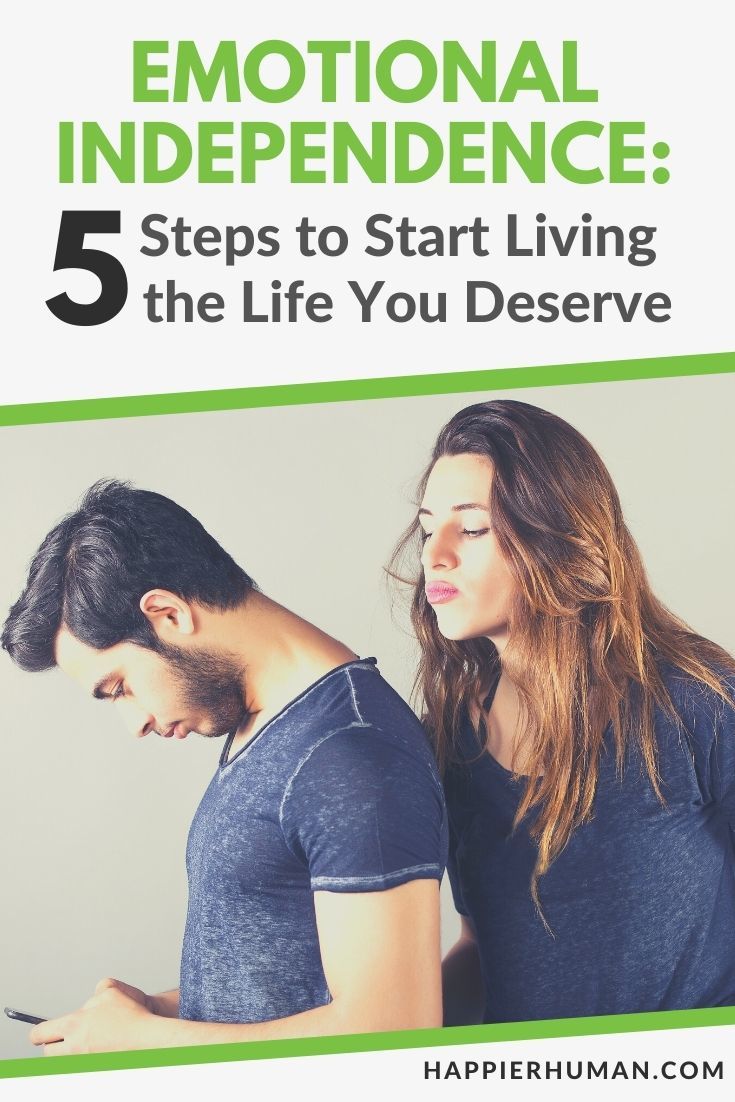There might be affiliate links on this page, which means we get a small commission of anything you buy. As an Amazon Associate we earn from qualifying purchases. Please do your own research before making any online purchase.
“I don’t need you, I prefer you.” – Walter Riso
I believe this quote sums up emotional independence perfectly.
It is incredibly liberating to know that you are in control of your emotions; to spend time with someone because you want to, not because you need to.
In a nutshell, emotional independence is about having freedom and options, something we all want.
Although the idea of emotional independence may look good on paper, it takes courage, self-exploration, personal responsibility, and mental resilience to cultivate this mindset.
You need to break yourself before you can make yourself an emotionally independent person. No one can give you this, except YOU.
The process of finding your version of emotional independence is a personal journey, one that will bring authentic and lasting happiness in your life.
I am just here to open the door and help you take those first steps. That’s all.
What Does Emotional Independence Look Like?
Emotional independence comes from within.
It is a mindset and a way of living with profoundly personal implications. Your version of emotional independence is different from my version and everybody else’s version.
It is difficult to put into words the feeling that you experience when you come to terms with the uncontrollable and take charge of the one thing worth mastering – your mindset.
Nevertheless, I will do my best to paint a clear picture of how an emotionally independent life looks like.
Being emotionally independent does not mean running away from emotions.
Especially unpleasant ones like guilt or shame.
Instead, you take responsibility for your feelings, even if that means putting yourself through emotional discomfort.
In other words, emotional independence begins when you stop ignoring the least pleasant aspects of your life and start taking a good look at yourself.
People who have successfully cultivated this mindset tend to live responsible, reflective, and authentic lives.
That allows them to explore and navigate their entire emotional spectrum without getting caught up in drama, self-pity, and regret.
Being emotionally independent involves a healthy perspective on emotions.
Whenever you experience an unpleasant emotion, your brain records this event and will prompt you to avoid similar situations in the future.
That is why every time you find yourself in a situation that’s causing you emotional discomfort, your first impulse might be to avoid, ignore, rationalize, or make that feeling go away somehow.
But before you blame yourself for this attitude, keep in mind that your brain is naturally inclined to choose the best possible way out of discomfort and, whether we like it or not, avoidance is a quick and easy fix.
But people who have achieved emotional independence don’t see it this way.
Even when they find themselves in emotionally demanding situations, they are acutely aware that feelings do not last forever, and their mind will eventually adjust to discomfort.
Being emotionally independent means finding happiness within.
In other words, emotionally independent people don’t say “I will be happy when…” or put others in charge of their well-being.
Instead, they take responsibility and create their version of lasting happiness by finding joy and satisfaction within.
Let me give you an example. None of us is born with the desire to own fancy cars or expensive clothes (assuming owning these items makes you happy). We learn to desire them by living in a culture that labels such possessions as valuable and desirable.
But just as your mind can generate a sense of satisfaction from owning expensive stuff, so it can learn to create happiness from cheaper, more accessible experiences.
If you wish to achieve emotional independence, let go of the I-will-be-happy-when mentality and start expressing gratitude for the beautiful people and experiences you already have in your life.
Being emotionally independent means validating yourself, in good times and in bad.
It is easy to think and say nice things about yourself when life is good, and everything seems to go as planned.
But what happens when life takes a turn for the worse? Would you be able to trust and validate yourself in times of distress and uncertainty?
Whether they are dealing with failure, uncertainty, and distress or success, comfort, and stability, people who have reached emotional independence never lose their sense of self-worth.
As you can see, emotional independence can contribute significantly to your happiness and well-being.
But as with any other healthy practice or mindset, it takes some effort to cultivate it.
“There is no love fully capable of filling the void in a person who does not love himself.” – Unknown
4 Signs You Might Be Emotionally Dependent

Believe it or not, there are people for whom the idea of being entirely in charge of their emotions sounds scary.
When codependency runs in the family, independence may seem like a far-fetched dream.
We grow so accustomed to relying on other people that we cannot even visualize the joys and benefits of emotionally independent life.
Here are some of the telltale signs of emotional dependence:
1. The mere thought of being abandoned sends chills down your spine.
I’m sure we can all agree that being dumped/abandoned sucks.
Who in their right mind would want to invest in a relationship only to see the other person leave?
But that’s the risk we take when we choose to forge an emotional bond with another person.
Emotionally dependent people live in constant fear of being abandoned. They put their partner’s needs above their own and focus most of their time and energy on pleasing him/her.
No matter how challenging or unfulfilling the relationship might be, people who are emotionally dependent on their partner will never leave, unless they somehow manage to find a replacement first.
2. You are having trouble setting boundaries.
Boundaries are essential in almost every aspect of our lives. For instance, boundaries help us maintain a healthy lifestyle by preventing us from overeating, wasting hours in front of the TV, or abusing substances.
But for emotionally dependent people, setting boundaries is a source of stress and anxiety.
Whenever they start a new relationship, they tend to become pathological pleasers, giving up on anything their partner might find annoying, distasteful, or unpleasant. As you can probably guess, this attitude results from their fear of abandonment.
Long story short, if you feel like you cannot express yourself freely because you’re afraid the other person will reject you, what you’re experiencing is not selfless generosity but emotional dependence.
3. Your friends, family members, or life partner are the center of your universe.
People who forge relationships based on emotional dependence tend to play a different role depending on the person they are with.
When they find someone new, they give up on enjoyable activities and hobbies and replace them with whatever they believe their partner might find exciting and appealing.
Unfortunately, this toxic mindset does not stop at hobbies and fun activities. In time, their opinions, beliefs, and world views begin to resemble those of their partner.
4. You cannot find the courage to end a relationship.
Although they claim to be happy with their relationship, deep down, emotionally dependent people know that is not true.
It’s easier to pretend everything is okay than to confront the uncomfortable truth and prioritize your well-being.
Whenever they find themselves away from their significant other, people with emotional dependence experience a lot of distress and anxiety, which can culminate in panic attacks.
5 Steps to Achieve Emotional Independence

1. Stop blaming others for your unhappiness
Emotional independence begins with personal responsibility.
That means making decisions without seeking reassurance at every step, owning your mistakes, knowing when to give up, and unselfishly prioritizing yourself.
But we all know that is easier said than done.
In reality, whenever something bad or unpleasant happens, our first instinct might be to look for someone to blame for our misfortune.
“It wasn’t me; it was him!”
“Why is everyone against me!?”
“I think somebody up there hates me.”
The problem with this attitude is that it strengthens your victim mentality and strips you of your personal power.
Whenever you feel like you’ve been dealt a bad hand, take a moment to discover your share of responsibility and think about how much control you have over the situation.
If the outcome was within your control, use this insight to avoid such situations in the future.
If the outcome was not in your control, simply move on knowing that the world isn’t always the way you expect it to be, and people don’t always behave the way you believe is appropriate.
2. Know how your brain works (and rewire it)
The human brain has evolved to produce sensations, thoughts, and emotions, but only a brain connected to the environment or other minds will produce them.
From this perspective, we could argue that the mind is the architect of our reality, a reality which, in turn, shapes the way we think, feel, and behave.
That is the reason why we tend to look outward whenever we wish to explain why we felt or behaved a certain way. That’s why we say, “You make me feel…” or “Look at what you made me do.”
But thoughts and emotions are primarily mental constructs, not consequences of external events. Ten people can have ten different emotional reactions to the same situation.
There is no point in blaming your boss, family members, life partner, or society for how you feel, think, and behave.
If you wish to achieve emotional independence, start by looking inward because that’s where you have the most control. The outside world will move on regardless of your needs, wants, and preferences.
Whenever you feel unhappy or dissatisfied with someone or something, ask yourself this: Is there another way I can look at things so I don’t end up upsetting myself over someone or something I can’t change?
Long story short, don’t believe the first thoughts that come to mind. Instead, try to look for other explanations.
An emotionally independent life is an examined life.

3. Discover your character strengths
People who have achieved emotional independence have a robust set of character traits that help them navigate the unpredictable aspects of life.
In a world where control and stability are merely illusions that keep us from falling into an existential crisis, your character traits provide a stable bedrock upon which you can build your future.
Character traits are part of our personality and influence the way you feel, think, and behave. Discovering them is a practical way to cultivate self-awareness and self-growth.
Each trait represents an anchor that keeps you close to who you are and helps you be less reactive to life’s unexpected turns. In other words, your character is a framework for smart decision making and implicitly emotional independence.
That’s why they call them strengths.
If you wish to discover your character strengths, visit viacharacter.org and take the free survey.
Based on the five primary character strengths that define your personality, you can then think of practical ways to manifest those traits into your life.
4. Accept the harsh truths of life
That is probably the toughest step towards emotional independence because it requires you to adjust your outlook on life.
In general, we like to think that life is governed by a set of rules which, if we follow to the letter, will bring us lasting happiness and success. Rules like, “Stay in school, and you’ll be successful” or “Be a nice person, and others will return the favor.”
However, reality tells an entirely different story. In other words, not everyone who studies hard becomes successful.
Some people run six-figure businesses without even having a college degree. As for being kind, there is a good chance you will encounter people who take advantage of your good nature.
I am not trying to say that you should drop out of school, adopt a “Me…Me…Me” attitude, and do whatever you like regardless of consequences.
All I’m saying is that to reach emotional independence; you should always adjust your expectations based on how reality looks like, not how you believe reality should look like.
In fact, here are a couple of harsh truths about the world we are living in:
5. Cultivate gratitude
We know for a fact that living with a general sense of dissatisfaction creates a vicious circle of frustration, emotional pain, and constant complaining.
Fortunately, there is one solution for this self-defeating mentality – gratitude.
Even though gratitude is not as tangible as a fat bank account or a brand-new sports car, this practice has a much greater power to change your life than all the material things put together.
Gratitude makes you stop taking life for granted and shows you see all the good things you already have in your life. In other words, you learn to enjoy the things you have, instead of complaining about what you don’t have.
One practical way to cultivate this attitude is by making a gratitude box.
Start by picking a small box where you can put all the things that you’re grateful for.
At the end of each day, write one thing you’re grateful for on a sticky note or piece of paper and put it in the box.
Whenever you feel dissatisfied with your life, open the box, and take a good look at all the wonderful things that have happened to you.
Gratitude reminds us that happiness and satisfaction are within our control. All we need to do is learn to enjoy the life we have, instead of constantly searching for fulfillment in situations and material possessions that are not (yet) within our grasp.
Final Thoughts on Emotional Independence
Authentic happiness is a state of mind that you can only achieve when you:
Once you overcome these self-defeating beliefs and attitudes, you can:
That’s how an emotionally independent life looks like.
Now, if you want to find more meaning to your life, then you can do this by identifying your life purpose. These 19 life purpose examples can help you get started.

Alexander Draghici is a licensed Clinical Psychologist, CBT practitioner, and content writer for various mental health websites. His work focuses mainly on strategies designed to help people manage and prevent two of the most common emotional problems – anxiety and depression.


